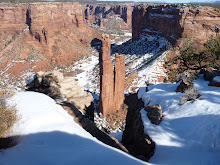We're in sort of a holding pattern...it's too early to start packing, and too late to start any new projects before we go, so there's not much to blog about. However, I did have an interesting conversation with one of the rangers today. I was looking for Budd, to get the key for the bunkhouse so I can do laundry. Didn't find him, but I did find Tess, whose books I need to return. We started talking about one that I want to give her, and the conversation came around to the linguistic relationship between the Creek people in that book and the Navajos. Long story.
Anyway, William, the ranger, was sitting there so I got the opportunity to ask him some things about the Navajo language that I've been wondering about...how to pronounce the name of the canyon, for example. Turns out all those diacritical marks mean whether the tone of the vowel is high (if there is an accent mark over it) or low (if not). The apostrophes denote glottal stops, as I suspected. So Dineh, with the second syllable falling in tone, is the proper way to pronounce the Navajo word for 'People', which is what they call themselves. The name of the canyon sounds like Tsay-ye-eh, but the last syllable is stopped, not drawn out. It's easy to see how the Spanish made that into 'Sha ye', which they then spelled as they would to make the 'y' sound in their own language...a double-l. Who knows when the second syllable would have dropped off, to make the 'Shay' pronunciation that's common today.
The Navajo word for 'white person' is bilagaana, with an accent over the first a after the g. Bil a gah ah na. William told me that there are two possible ways this word could have been developed. One was a combination of the words for 'hand' and 'destroy', which, from what I've learned about the history, I can certainly understand. William told me his preferred theory is that it was a corruption of the Spanish word for a female American...Americana. I guess there is some evidence for this type of cross-language usage and corruption; for example, the Navajo word for 'money' is 'beso', a corruption of the Spanish 'peso'. Navajos didn't have any use for money before the Spanish came trading and raiding, so they didn't have it or a word for it in their own language.
I'd probably enjoy learning more, but there won't be time as we leave for Organ Pipe Cactus Nat'l Monument at the end of next week. The Native Americans in that area aren't Navajo.
William was also able to tell me a lot about how and why the Athabascan group of languages spread, and what others spread where else. He was acquainted with a linguist who studied it, and now I know where to look for more information. Linguistics and etymology have always interested me, more so lately.
I never did find Budd, so I may have to put the sheets back on the bed until tomorrow, since my online work schedule is from 2-6 this afternoon. Well, at least it's not a futon and a sleeping bag--not-quite-clean sheets is a hardship I can live with.

Cheri, Wow! what a fantastic blog. I am glad that you gave me this. Now i can keep track of you better. Yours, Tess
ReplyDelete